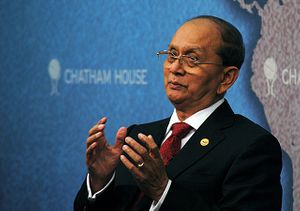On December 11, The Asia Foundation released the first ever nationwide survey conducted in Myanmar, documenting public knowledge and awareness of new government institutions and processes. The survey, which was conducted in May and June 2014, included face-to-face interviews with more than 3,000 respondents across all 14 Myanmar states and regions. Given this rare statistical snapshot of what the people of Myanmar think about their country, it is worth examining some of the survey results carefully.
Overall, in my view the survey findings seem to indicate that while the people of Myanmar are cautiously optimistic about the future of the country, that optimism masks several potentially troubling indicators, including a paucity of knowledge about politics and government, a high degree of political polarization, a distinct lack of social and political trust, and substantial support for a paternalistic style of governance.
The good news first: The survey revealed a cautious optimism among the people of Myanmar about their nation’s political future. A majority (62 percent) believed things in Myanmar are going in the right direction. Ninety three percent of respondents expressed an intention to vote in the 2015 elections and 77 percent of them believed voting can lead to improvements in the future. That optimism remarkably spills over even into hopes about the outcome of the seemingly intractable peace process, with 64 percent expressing confidence that it would end armed conflict in the country.
But this optimism is offset by several potentially troubling indicators. First, knowledge of government is quite low across the board. Eighty-two percent of respondents were unable to name any of the branches of government. Beyond this, many respondents also displayed a lack of knowledge about the appointment process for key government positions, the functions of individual branches of government, and even the 25 percent reservation of parliamentary seats for the military which often consumes international observers.
Second, the findings indicate that the respondents displayed deep political polarization. For example, 41 percent said they would end a friendship if a friend supported a political party most people do not like (which the survey uses as a personal measure of political polarization). Now, that polarization may not necessarily translate into hatred towards other groups. For example, 57 percent still agreed strongly that ethnic minorities needed additional help to make them more equal with other communities. But that trend still stands out nonetheless given what we know about ethnic conflicts and instances of communal violence in the country.
Third, social and political trust is also quite low. An “astounding” (as the report puts it) 77 percent of all respondents believe that most people cannot be trusted, while public trust in various governance institutions was also tentative at best. There is also very low participation by citizens in improving society in government, with only 18 percent of respondents saying they had participated in such activities.
Fourth, there was a high support for a strong, almost paternalistic style of government and a lack of understanding of what democracy actually means. Most interestingly, 43 percent of respondents believed that “the government should be like a father and the people like children.” When asked about what it means when a country is called a democracy, “freedom” was most frequently mentioned (53 percent) but just 3 percent mentioned “government of the people,” with more than a third of respondents (35 percent) saying they did not know.
In an interview with Deutsche Welle on December 15, the report’s author and The Asia Foundation’s country representative in Myanmar Kim Ninh said that given Myanmar’s legacy of an authoritarian past, a history of ethnic conflicts, and decades of repressed political expression, it was no surprise that trends like high polarization and low trust were observed in the survey. Nonetheless, the results also clearly demonstrate that there are still considerable challenges that the government will need to confront in order to sustain and deepen democratic institutions and practices in the country.

































